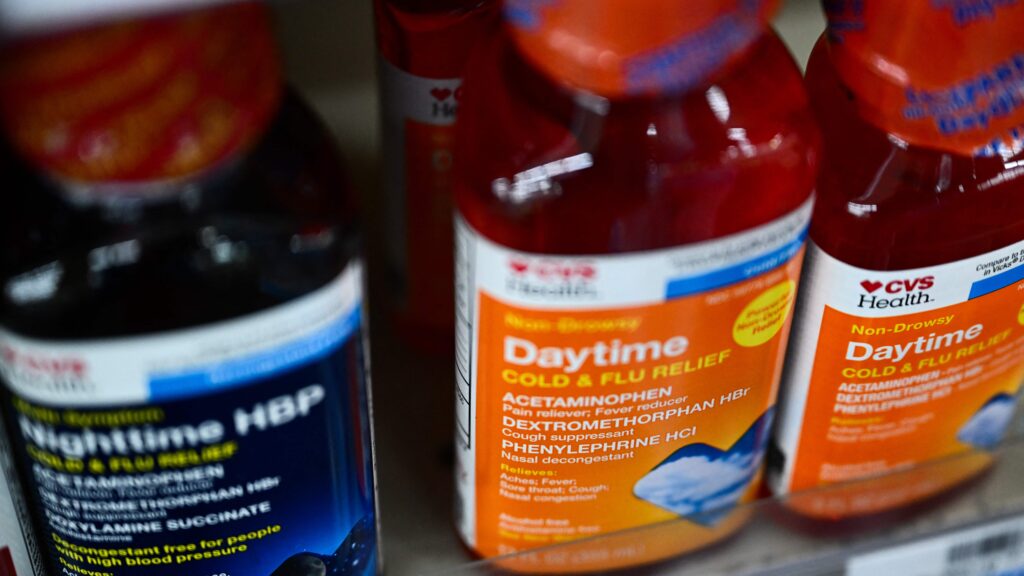As the temperatures cool, the season of colds, flu, and now Covid-19 is heating up. If you’re like many people, you’ve probably stocked up on over-the-counter cold medicine to help thwart the cough and runny nose circulating this time of year.
But you might be questioning your arsenal right now. An FDA advisory panel just concluded that a very common decongestant called phenylephrine is not effective when taken orally. Phenylephrine is found in everything from some Sudafed products (namely, those not behind the counter) to Dayquil.
The FDA’s document reviewing evidence for the efficacy of phenylephrine suggests it is not effective compared with placebo. But this is different from saying that phenylephrine is not effective, per se. If you’ve ever taken a Sudafed PE pill and felt your nasal congestion clear up, it’s probably because your nasal congestion actually did clear up. That is because the placebo effect reduces symptoms. Dismissing it entirely does not help patients.
Consider, for example, a 2016 study by Eli Meltzer and colleagues that the FDA cited as one example showing the lack of effectiveness of phenylephrine. Patients received either a placebo or phenylephrine and rated their symptoms from 0 to 3. Regardless of which group patients were in, the average symptom reduction was around 0.4 points. In other words, the drug did not reduce symptoms more than the placebo. It is therefore tempting to say, “the drug doesn’t help cold symptoms.”
The reality, however, is more nuanced. Patients receiving the drug felt better, but not because of the medication — they felt better due to the placebo effect and the passage of time. What’s ineffective was the chemical ingredient in the drug. There is a difference between a drug failing to relieve symptoms and a drug failing to relieve symptoms over a placebo.
The placebo effect, especially for subjective symptoms such as pain or congestion, can be large. That might be why, in one study, more than half of U.S. physicians said that they prescribed a placebo treatment (such as vitamins for an ailment unrelated to a vitamin deficiency) in the past year. Research by one of us, Michael, has also pointed to the widespread use of placebos in medicine. In another study of primary care physicians, one doctor told those of us conducting the focus group, including Michael: “[W]e use pharmaceuticals as placebos all the time. … Secretly we’re thinking ‘I don’t think this is gonna help them.’ ” In yet another study, two out of three psychiatrists reported that, at least on some occasions, they prescribe medication that has not been shown to be significantly more effective than placebo. In “The Powerful Placebo,” medical historian Arthur Shapiro quipped that the effectiveness of placebo, “has been attested to, without exception, for more than two millennia.”
However, physicians can leverage this knowledge of the placebo effect in more subtle ways. At its core, the placebo effect is about expectation — if you expect something to make you feel better it probably will. And as discussed in a forthcoming book co-edited by Michael, the opposite, called the “nocebo effect,” is also true: The expectation of illness can cause one to feel sick. Doctors should therefore be very careful about the language they use. Projecting hope, confidence, and, when it is honest to do so, a positive prognosis can be very beneficial. In one example of this, Kari Leibowitz and colleagues at Stanford University showed that the itchiness people experienced after a skin prick can be reduced when a healthcare provider told them that their “allergic reaction will start to diminish.”
The FDA may now reconsider whether pharmaceutical companies should be permitted to use phenylephrine. If it is ultimately removed from the market, there may be some unintended consequences. People who have previously gotten relief from phenylephrine will no longer have that treatment option. That is, the FDA will prevent them from deriving a benefit, albeit due to placebo, for a widely used drug. And because some people have had a learned response of feeling better when taking these drugs, the placebo effect from phenylephrine will likely be stronger for it than for alternatives such as homeopathic remedies.
You might think that now that the public is aware phenylephrine is effectively a placebo, patients will no longer benefit from taking it. But even here, the story is more complicated. Research has suggested that in some cases, patients can improve from a placebo even if they know it’s a placebo. This is a line of work we are currently investigating with colleagues as part of the NIH-funded Center for Biomedical Research Excellence on Opioids and Overdose at Rhode Island Hospital.
It’s also worth wondering: If phenylephrine were banned, would this set the precedent that anytime new research fails to find a difference between an established treatment and placebo, the treatment should be removed from the market? If the answer is “yes,” then it is important to bear in mind that some research has questioned the extent to which prescription medication for depression and surgeries for orthopedic conditions are efficacious relative to placebo.
To be clear, we are not advocating for or against any particular outcome regarding the use or availability of phenylephrine. We only wish to highlight that using this drug may still reduce symptoms, just not in the way people think.
Michael H. Bernstein, Ph.D., is an assistant professor of diagnostic imaging at the Warren Alpert Medical School of Brown University and a research scientist at Rhode Island Hospital. He is director of the Medical Expectations Lab and an editor of the forthcoming book “The Nocebo Effect: When Words Make You Sick.” Grayson L. Baird, Ph.D., is an associate professor of diagnostic imaging at the Warren Alpert Medical School of Brown University and a research scientist at Rhode Island Hospital. He is director of the Brown Radiology Human Factors Lab.


